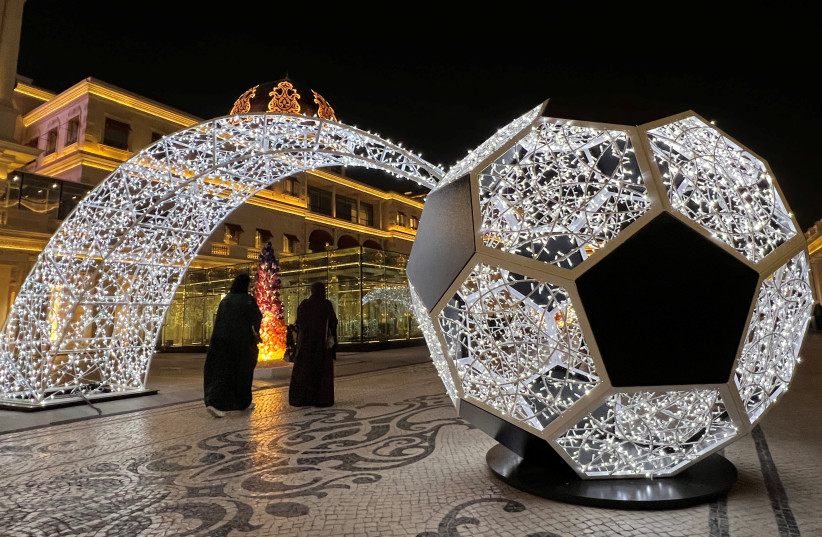No Israelis complained to the diplomats stationed in Qatar for the World Cup of mistreatment, contrary to the impression from videos on social media, Iris Ambor, head of the Foreign Ministry’s delegation to Doha, said on Wednesday.
“We haven’t heard complaints of hostile from Israeli tourists here,” Ambor said in an interview.
“We haven’t heard complaints of hostile from Israeli tourists here.”
Iris Ambor
Israel and Qatar do not have diplomatic relations, but one of FIFA’s conditions for hosting the World Cup is that citizens of all countries can attend the tournament. Qatar agreed to allow a small delegation of Israeli diplomats into the country for the duration of the games, and for there to be direct flights between Tel Aviv and Doha.

Viral videos of Israelis harassed at Qatar World Cup
In the days since the World Cup began, videos of Israelis, especially Israeli journalists, being harassed by fans from Arab countries have gone viral in the Middle East. Many show people shouting anti-Israel and pro-Palestinian slogans, and trying to obstruct the reporters from working.
An Israeli comedian, Guy Hochman, left Qatar after videos in Arabic showing him in IDF uniform and accusing him of being a spy appeared on social media, but Ambor said the Foreign Ministry was not involved in his case.
Despite the demonstrated hostility to Israel by some fans, and though she is in daily contact with Israeli journalists in Qatar for the World Cup, Ambor said most of the Israeli diplomats’ work so far was helping several people recover lost passports.
The lack of complaints from visiting Israelis is likely a sign that the Foreign Ministry’s “Safe World Cup” campaign worked, Ambor posited. Among the recommendations of that campaign, which was made available in Hebrew and Arabic and had over 2 million views, is for Israelis not to publicly highlight where they come from.
“We emphasize again that we are guests in this country, a country that doesn’t have ties with Israel, a country with a specific culture,” Ambor said. “We have to behave in a way that respects them and us. I think everyone will have safe World Cup.”
“We’re happy not to be too busy, which means people really listened and are doing what they should,” she stated.
The diplomats were treated “totally fine,” Ambor said. “We were met at the airport; [Qatari authorities] check that we’re okay. It’s reasonable. They accepted us because they had to, but they’re good hosts.”
One of the goals of making sure Israelis are welcome at the World Cup is “to create an unmediated platform for the nations to get to know each other,” she said.
Though, officially, neither Israel nor Qatar have said that this is a step towards normalization, Ambor said: “As diplomats, it is our work to advance ties and to open these doors and windows and to always hope that we can build relations. I hope it’ll happen but I can’t promise.”
As for Ambor herself, the diplomat, who usually works as director of coordination in the Foreign Ministry Director-General's Office, attended her first-ever soccer game on Tuesday, watching England vs. Wales.
“It’s very interesting to see the special atmosphere of the World Cup,” she said. “There’s a feeling that the whole city is decorated and focused on soccer.”
Doha is very organized and ready for the masses of tourists, and people have been very helpful, Ambor said.
She also noted that a lot of the food is similar to what one finds in Israel, such as hummus and falafel; there was even a best knafeh contest.
But Ambor also made sure to partake in Jewish food that is less common in Israel, enjoying a kosher bagel with Rabbi Marc Schneier of New York, who served as Qatar’s adviser on how to accommodate Jewish visitors during the World Cup.
